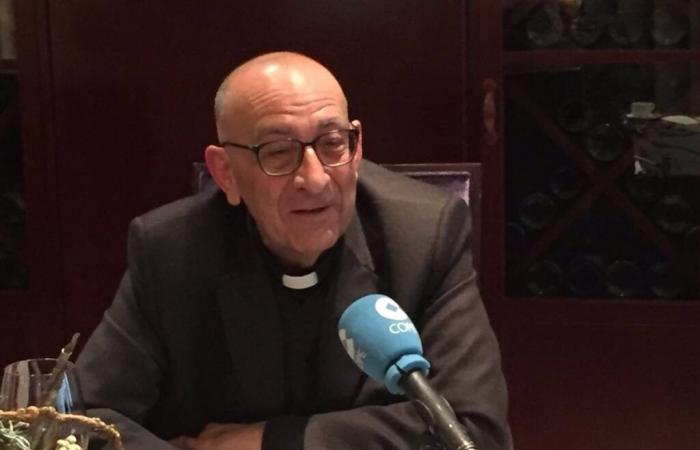President of the EEC between 2020 and 2024, he tried to mediate between Rajoy and Puigdemont in 2017
MADRID, 6 May. (EUROPA PRESS) –
The archbishop of Barcelona, Cardinal Juan José Omella, is one of the six Spaniards electors who will choose the successor of Pope Francis, in which conclave that starts this Wednesday, May 7. His name is like possible ‘daddable’ although his age, 79, could play against some experts, as well as his interest in politics. In the last week, asked about the possibility of being the new pontiff, he said he had never thought “to be a potato.
Cardinal Juan José Omella was born in the Turolense town of Cretas in 1946. He studied at the Seminary of Zaragoza and in the formation centers of the White Fathers in Leuven and Jerusalem. In 1970, he received priestly ordination. In his priestly ministry, he worked as a coadjutor and as a pastor between 1990 and 1996, and as Episcopal Vicar in the Diocese of Zaragoza. In addition, for a year he was a missionary in Zaire.
In 1996 he was appointed Auxiliary Bishop of Zaragoza, the year in which Bishop was also ordered. Already in 1999, he was appointed bishop of the Diocese of Barbastro-Monzón and, between 2001 and 2003, was Apostolic Administrator of Huesca, a period in which he was also Jaca Apostolic Administrator.
In 2004, he was appointed bishop of the Diocese of Calahorra and the Calzada-Logroño and, in 2013, he was invested a prior honorary of the Virgen de Valvanera by the chapter of Knights, due to his work with the pilgrimage of the Virgin by the different Riojan municipalities on the occasion of the year of faith.
The following year, in 2014, he was chosen a member of the Congregation for Bishops and was renewed 2017, the year in which Francisco also appointed him a member of the Supreme Court of the Apostolic Signature.
In 2015, his appointment as Archbishop of Barcelona was made public and, two years later, in 2017, Cardinal was created with the title of Santa Cruz de Jerusalem by Pope Francis, who in 2023 appointed him a member of the Council of Cardinals.
At the Spanish Episcopal Conference (CEE), he is a member of the Permanent Commission and the Council of Cardinals and was president of the CEE from March 2020 to March 2024. He has also been a member of the 2017-2020 Executive Committee; Member of the Episcopal Social Pastoral Commission since 1996, being also its president from 2002 to 2008 and, again, during the 2014-2017 triennium. It has also belonged to the Pastoral Episcopal Commissions (1996-1999) and Seglar Apostolate (1999-2002/2008-2011); And it has been National Consiliario de Manos Unidas (1999-2015), among other positions.
-Omella has always expressed his political concerns when he has been asked about it, such as when in an interview in September 2024, in ‘La Vanguardia’, he said that he had “calmed down a bit” the tension of the ‘procés’, while defending that the current Generalitat led by the PSC tried, textually, tend a bridge within the Catalan society and another between Catalonia and the rest of Spain.
This interest in politics led him to recognize, in 2018, in an interview with Catalunya Ràdio, who tried to mediate between the then president of the Government, Mariano Rajoy, and the one who was president of the Generalitat, Carles Puigdemont, on the occasion of the illegal referendum of independence held October 1, 2017.
Subsequently, in 2020, Puigdemont lamented this mediating role: “He didn’t behave like a church man. He behaved as a state man. And this seems unacceptable to me.” In his opinion, although he tried a mediation, he argued that he did it “with little conviction.” “In relation to political prisoners, in relation to all of us and the suffering of our families has not been an exemplary Christian,” he said.
Omella has also been a defender of Church’s work in education and argued that “children are not from the State, but that children are from families and the State is erected by individuals to work at the service of families to help them, when they require it, in their educational mission,” in response to statements by the former Minister of Education, Isabel Celaá.
Always pending today, after knowing on April 14 the declaration of the architect Antoni Gaudí as ‘venerable’ by Pope Francis, said that it is a “very important step” to continue in his beatification and recalled that he worked a lot of faith and wanted to give God to God in the Holy Family.
He has never thought “to be a potato
On the other hand, last Easter Monday, on the occasion of his 79th birthday, in statements to the media in Barcelona after the death of Pope Francis, Omella said he had never “thought” of being a potato or that it was something that was in his head so, asked in the face of the possibility of being chosen, he argued that the pools never succeed.
Days later, in an article published in ‘La Vanguardia’ collected by Europa Press, he remembered Pope Francis as a prophet and defense lawyer of the common house, in reference to the land, in addition to helping to become aware of the “necessary presence” of women in the mission of the Church.
On the future Pontiff, he stated in several interviews that a new young pope prefers to a more older one, but said he does not see age as the “decisive” factor
Precisely this Tuesday, May 6, in a letter addressed to the faithful of Barcelona since Rome, he said that many of the cardinals first attend a meeting of this nature, and has assured that it is “a crucial moment for the Church.” “The debate is not whether we have to be progressive or conservative, but the goal is to be deeply faithful to the Gospel,” he defended.






